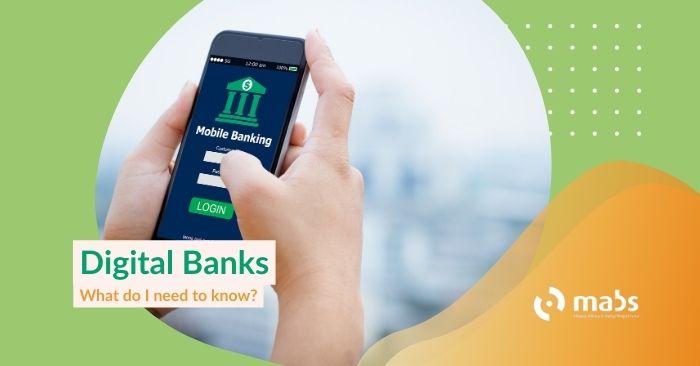Digital Banks – what are they and what do I need to know?

You may have heard of many people now choosing to manage their money through online banking or with ‘digital banks’. This shift has been evident in Ireland in the last 2-3 years, with over three quarters of the population using internet banking (CSO Ireland, 2021).
Fact: nearly eight in ten (78%) internet users used internet or mobile banking (includes PayPal, Revolut, etc.) in 2021. The age group that was most likely to use internet banking was the 30 to 44 years age group (84%) (CSO Ireland).
With this rise in online banking, we wanted to dive into the world of digital banks and answer some of the most popular questions, such as:
- What is a digital bank?
- How does it differ from a traditional bank?
- Can I lodge a cheque or cash to a digital bank?
- What are the fees and charges for digital banks?
- Why would I choose a digital bank over a traditional bank?
Let’s begin…
1. What is a digital bank?
A digital bank is simply a bank that operates primarily via an application (app) on your mobile device or by visiting a dedicated website online. They are sometimes called disruptor banks because they have “disrupted” the traditional way of banking.
Examples of digital banks in Ireland are Revolut, N26, Money Jar and Bunq.
2. How does a digital bank differ from a traditional bank?
A digital bank does not have a physical presence or branch, which a traditional bank does. All banking facilities are offered and accessed through an app or online. It’s important to note that traditional banks now also provide their services online and via apps in a similar way to digital banks.
3. Can I lodge a cheque or cash to a digital bank?
The quick answer, no.
Digital banks do not have branches or dedicated ATMs. Therefore, you cannot lodge physical money or cheques.
However, you can have your wages or welfare payments lodged directly to your account using electronic fund transfer sometimes referred to as EFT.
4. What are the fees and charges for digital banks?
As with any bank, the fees differ and there are different options available. For example:
- Revolut and N26: basic free account (where you don’t have a monthly fee).
- Bunq: €2.99 monthly fee for its basic account (known as Bunq Easy Bank)
- Money Jar: €2.99 a month monthly fee (plus pay as you go transaction fees)
This information is correct at the time of publication. It is worth shopping around and reviewing each based on your situation. Some providers might offer discounts and exclusive offers.
Some digital banks offer premium accounts that come at a higher monthly cost but include fees you might incur on the basic accounts. You can find all the accounts and associated charges below
5. Why would I choose a digital bank over a traditional bank?
It is entirely down to the way you like to bank.
If you primarily use contactless payments or want an effortless way to send payments to friends or family, then a digital bank will make sense. However, if you use cash and cheques and tend to pop into your local branch then a digital bank would not match your needs.
Look at your bank statements to give you an indication of what you currently pay in fees. Don’t just look at your monthly fee – look at the fees for direct debits, ATM/cash withdrawals and even contactless payments.
This will give more insight into both how you use your bank account and how you spend your money. Use this information to help you decide if a digital or traditional bank is the best fit for you.
Help is here
We hope that you found our discussion on digital banking helpful and that you can make a more informed decision if online or traditional banking suits you best.
If you have a query on digital banks or a general money, budgeting or debt-related query, you can call the MABS National Helpline on 0818 07 2000 Monday to Friday, from 9am to 8pm or find the contact details for your local office.
Don’t forget to follow us too at @MABSinfo – Facebook, Instagram., or Twitter.
Disclaimer: This blog does not represent legal advice and is intended for guidance only. If you are concerned about your current or future personal financial situation, then please contact an adviser from MABS. Advisers are available by phone and email.
Note: We welcome references to and use of the content in this blog. However, please reference MABS and link said content if you choose to do so.




Facebook
twitter
Instagram